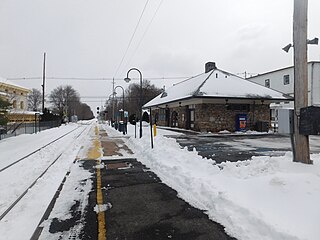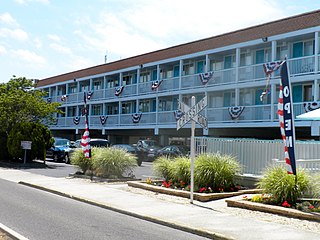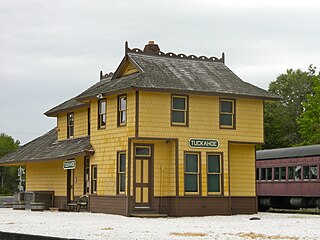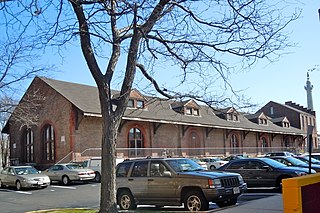
Independence Township is a township in Warren County, in the U.S. state of New Jersey. As of the 2020 United States census, the township's population was 5,469, a decrease of 193 (−3.4%) from the 2010 census count of 5,662, which in turn reflected an increase of 59 (+1.1%) from the 5,603 counted in the 2000 census.

The Central Railroad of New Jersey Terminal, also known as Communipaw Terminal and Jersey City Terminal, was the Central Railroad of New Jersey's waterfront passenger terminal in Jersey City, New Jersey. The terminal was built in 1889, replacing an earlier one that had been in use since 1864. It operated until April 30, 1967.

Hillsdale is an active commuter railroad station in the borough of Hillsdale, Bergen County, New Jersey. Servicing trains on New Jersey Transit's Pascack Valley Line, the station is located at the intersection of Broadway and Hillsdale Avenue. The next station to the north toward Spring Valley station is Woodcliff Lake and the next station to the south toward Hoboken Terminal is Westwood. The station contains one track while a single low-level side platform next to the station depot, resulting in no accessibility for handicapped persons under the Americans with Disabilities Act of 1990.

Park Ridge is an active commuter railroad station in the borough of Park Ridge, Bergen County, New Jersey. Located at the intersection of Park and Hawthorne Avenues, the station services trains on the Pascack Valley Line, which runs from Hoboken Terminal to Spring Valley station in New York. The station contains a single low-level side platform split by Park Avenue and a wooden station depot, built by the Hackensack and New York Extension Railroad. As a result, Park Ridge station is not handicap accessible under the Americans with Disabilities Act of 1990.

White House is a NJ Transit railroad station on the Raritan Valley Line, in the Whitehouse Station section of Readington in Hunterdon County, New Jersey. The station is on the west side of Main Street in the center and the station building has subsequently been turned into a branch library for the Hunterdon County Library system. This station has no weekend service.

Delaware is an unincorporated community and census-designated place (CDP) located along the Delaware River within Knowlton Township in Warren County, New Jersey. It was created as part of the 2010 United States Census. As of the 2010 Census, the CDP's population was 150. The area is served as United States Postal Service ZIP Code 07833.

Waldwick is a commuter rail station operated by New Jersey Transit in the borough of Waldwick, Bergen County, New Jersey, United States.

Bradley Beach is a railway station located at Railroad Square between Brinley and Lareine Avenues in Bradley Beach of Monmouth County, New Jersey. It is served by trains on NJ Transit's North Jersey Coast Line.

Demarest station is located in Demarest, Bergen County, New Jersey, United States. The station's depot was added to the National Register of Historic Places on July 7, 2004.

Washington is a former commuter railroad train station in the borough of Washington, Warren County, New Jersey. The station serviced trains operated by the Delaware, Lackawanna and Western Railroad on three different lines. Washington station handled the Lackawanna Old Road, which came from Port Morris Junction and continued to Portland, Pennsylvania; the Hampton Branch, which went to Hampton's Central Railroad of New Jersey station in Hunterdon County; and the Phillipsburg Branch, which operated to Phillipsburg Union Station. Washington station contained a single large brick depot and multiple platforms.

Ocean City 34th Street Station was located in Ocean City, Cape May County, New Jersey, United States. The station — a small wooden shelter with bench seating for a few passengers, located just south of 34th Street next to a rail line running down the middle of Haven Avenue — was built in 1885 by the Ocean City Railroad, which was acquired by the Atlantic City Railroad in 1901, and later by the Pennsylvania-Reading Seashore Lines. Trains last served the station in August 1981, when service was cancelled due to poor track conditions and limited funding from the New Jersey Department of Transportation.

Tuckahoe is a disused train station located in the Tuckahoe section of Upper Township, Cape May County, New Jersey, United States. The station was built in 1894 and was added to the National Register of Historic Places on June 22, 1984. The Cape May Seashore Lines offers excursion trips from Tuckahoe to Richland.

The Cary station is a historic structure in the Ledgewood section of Roxbury Township in Morris County, New Jersey. The building's earliest section was built in 1790, and an addition was built in 1890. In 1876, a station of the Central Railroad of New Jersey's High Bridge Branch was established on the property. The structure was added to the National Register of Historic Places on September 5, 1985, as Cary Station.

North Pemberton is a disused railway station located in Pemberton Township, Burlington County, New Jersey, United States. The station was built in 1892 by John S. Rogers and added to the National Register of Historic Places on May 23, 1978. The station became inactive in 1969 when rail service between Pemberton and Camden ended. The Township of Pemberton now owns the station and operates it as the North Pemberton Railroad Station Museum, a museum of regional history and a Welcome and Information Center for both the Pinelands and the Pemberton area.

Hopewell station is located in Hopewell, Mercer County, New Jersey, United States. The station was built in 1876. The head house has been on the state and federal registers of historic places since 1984 and was originally listed as part of the Operating Passenger Railroad Stations Thematic Resource. New Jersey Transit has proposed reopening the station to railroad service as part of the West Trenton Line.

Trenton is a historic railroad station located in Trenton, Mercer County, New Jersey, United States. The station was built in 1888 by the Philadelphia and Reading Railroad. It was located on the railroad's Trenton Branch. It was added to the National Register of Historic Places on May 14, 1979, as the Philadelphia and Reading Railroad Freight Station.

Dock Bridge is a pair of vertical lift bridges crossing the Passaic River at Newark, Essex County and Harrison, Hudson County, New Jersey, United States, used exclusively for railroad traffic. It is the seventh crossing from the river's mouth at Newark Bay and is 5.0 miles (8.0 km) upstream from it. Also known as the Amtrak Dock Vertical Lift, it carries Amtrak, NJ Transit, and PATH trains. It is listed on the state and federal registers of historic places.

The Morristown and Erie Railroad Whippany Water Tank is located in Hanover Township, Morris County, New Jersey, United States. The water tank was built in 1904 by the Morristown and Erie Railroad and was added to the National Register of Historic Places on September 6, 2006.
The Operating Passenger Railroad Stations Thematic Resource is a list of 53 New Jersey Transit stations in New Jersey entered into the New Jersey Register of Historic Places and National Register of Historic Places in 1984 for their architectural, historical, and cultural merit.

The Port Murray Historic District is a historic district in the Port Murray section of Mansfield Township, Warren County, New Jersey. It was an important transportation location, being on the Morris Canal and the Morris and Essex Railroad. The district was added to the National Register of Historic Places on June 7, 1996 for its significance in community development, architecture, and transportation from 1828 to 1915.






















